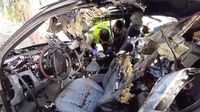On Sunday, September 21, 2025, the southern Lebanese town of Bint Jbeil was rocked by an Israeli drone strike that killed five people, including three children, and wounded two others. The attack, which has drawn fierce condemnation from Lebanese leaders and reignited international debate over the fragile ceasefire in the region, underscores the persistent volatility along the Israel-Lebanon border despite recent diplomatic efforts to de-escalate tensions.
According to Lebanon’s Ministry of Health and multiple accounts cited by The Associated Press, the victims included a father, Shadi Sharara, and his three children—Celine, Hadi, and Silane. The children’s mother, Amani, and their sister, Aseel, were injured in the strike and hospitalized for their wounds. The fifth fatality was identified as Mohammed Mroueh, who was riding a motorcycle when the drone fired two consecutive missiles: one at his vehicle and another at the Sharara family’s car. The town of Bint Jbeil, already battered by previous hostilities, was left reeling by what local officials and residents have described as a “massacre.”
The Israeli military, in a statement reported by AP, said the strike was aimed at a Hezbollah militant who was “operating from within a civilian population.” The statement continued, “The IDF regrets any harm to uninvolved individuals and operates to minimize harm as much as possible. The incident is under review.” Despite these assurances, the Israeli army acknowledged that civilians were killed, a fact that has only deepened outrage in Lebanon and beyond.
Lebanese Parliament Speaker Nabih Berri issued a statement identifying four of the victims—the father and his three children—as holding U.S. citizenship. However, the U.S. State Department offered a more cautious assessment, saying, “While the situation is fluid, so far, indications are that the five killed were not U.S. citizens. In fact, one had an unused immigrant visa petition in the past.” This discrepancy has added another layer of confusion and tension to an already fraught situation.
President Joseph Aoun, who was in New York to attend the United Nations General Assembly at the time of the strike, condemned the attack in the strongest terms. In a statement posted on X (formerly Twitter), Aoun said, “As we are in New York to discuss matters of peace and human rights, Israel continues its ongoing violations of international resolutions.” He called on the international community to pressure Israel to respect the ceasefire agreement reached with Hezbollah in late November 2024. Prime Minister Nawaf Salam echoed these sentiments, describing the incident as a “blatant crime against civilians and a message of intimidation aimed at our people returning to their villages in the south.”
The context for Sunday’s strike is a ceasefire agreement brokered by Washington in November 2024, which was intended to end a months-long war between Israel and Hezbollah that had claimed the lives of approximately 4,000 people in Lebanon and displaced thousands more. Under the terms of the truce, both sides were supposed to withdraw their forces from southern Lebanon and halt attacks. However, as L'Orient Today and other local sources report, Israeli forces have continued to occupy five strategic hilltop positions along the border, and the Lebanese army claims there have been more than 4,500 Israeli violations of the ceasefire since it was enacted.
Israel, for its part, insists that its ongoing aerial campaign in southern and eastern Lebanon is necessary to prevent Hezbollah from rebuilding its military capabilities. The Israeli military frequently states that it is targeting Hezbollah militants or infrastructure, and maintains that the group is attempting to reassert its presence despite the ceasefire. However, Hezbollah has publicly claimed that it no longer has a military presence south of the Litani River and has fired across the border only once since the truce. The group also refuses to discuss disarmament while Israeli strikes and occupation of Lebanese territory continue.
Hezbollah officials have seized on incidents like Sunday’s deadly strike to justify their refusal to disarm, arguing that the ongoing threat from Israel makes giving up their arms unthinkable. They have also criticized the effectiveness of the ceasefire’s international monitoring mechanism, which involves the United States, France, and United Nations peacekeeping forces. According to Hezbollah, these efforts have failed to prevent Israeli violations or protect Lebanese civilians.
Lebanese officials warn that the continued Israeli strikes are undermining the country’s attempts to disarm Hezbollah and could destabilize Lebanon’s fragile peace. The government, under pressure from the United States, Saudi Arabia, and domestic rivals of Hezbollah, has tried to chart a course toward gradual disarmament. Yet, as Sunday’s events demonstrate, progress remains elusive as long as violence persists along the border.
In Bint Jbeil, the aftermath of the strike has left deep scars. Mohammad Bazzi, president of the municipal council, told L'Orient Today that the attack was a “massacre of civilians,” describing how the bodies of the victims were “mutilated and scattered.” Images from the hospital show Amani Bazzi, the wounded mother, clutching photos of her slain children—a stark reminder of the human cost of the conflict.
International reaction to the incident has been swift but, so far, largely rhetorical. Calls for restraint and respect for the ceasefire have come from multiple quarters, but there is little evidence that such appeals are having a meaningful impact on the ground. As the death toll continues to climb—L'Orient Today reports at least 308 people have been killed in Lebanon since the ceasefire took effect—the prospects for a durable peace appear increasingly remote.
The tragedy in Bint Jbeil is a microcosm of the broader challenges facing Lebanon and Israel as they navigate a post-ceasefire landscape marked by mistrust, sporadic violence, and competing political pressures. For the families caught in the crossfire, the promises of peace remain heartbreakingly unfulfilled.
As Lebanon’s leaders renew their appeals to the international community and the world’s attention briefly turns to the battered towns of the south, the fate of the ceasefire—and the hope for lasting calm—hangs in the balance.



